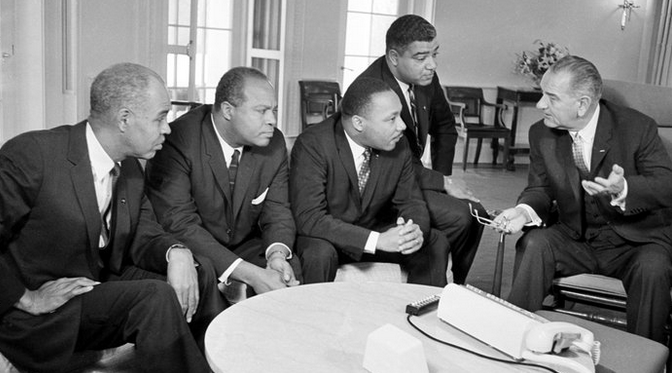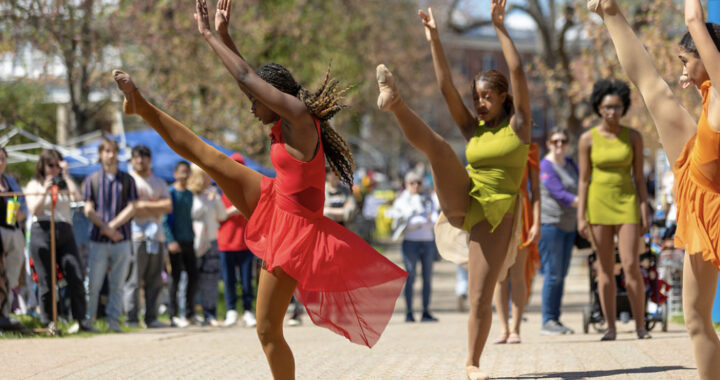Farmer’s Legacy: powerful influence of Civil Rights leader and UMW professor survives in the hearts of former students
3 min read
Farmer's classes filled lecture halls during his tenure as a history and American studies professor at Mary Washington. (Houston Public Media)
by KALEY MCCUSTY
Staff Writer
UMW is currently celebrating what would have been James Farmer’s 100th birthday. Farmer, who was a history and American studies professor at Mary Washington from 1985 to 1998, is remembered fondly by alumni who took his classes.
“Dr. Farmer engaged his students by telling stories,” said Kim Isaac, class of 1986. “He drew us into the story and made us feel like we lived it. As a history major, it was such a special treat to take his class because it wasn’t something we read in a book. He brought the Civil Rights Movement to us in living color.”
Many of Farmer’s students remember him as a gifted storyteller and credit him with an ability to bring history to life. Len Ornstein, class of 1994, described Farmer as “…an icon. He had this booming voice. He was a master storyteller.”
Dennis Rudnick described taking a class with Farmer as life-changing.
“In Dr. Farmer ‘s class, it was more than just reading a history book; we had someone who lived and made history,” he said. “From phone conversations with Bobby Kennedy to leaving Louisiana in a hearse under cover of night to avoid getting lynched, Dr. Farmer weaved a grand narrative in a way that was deeply intimate.”
During Farmer’s tenure at Mary Washington, his classes were highly sought after, filling the lecture hall in Monroe.
“It was a class everyone took when I was here… his class… [was a] rite of passage, a collective experience for us in those days. It was something all Mary Washington College students did at one point – take that class, read his book,“ said Ornstein.
Farmer’s ability as a storyteller and real-world experience had a significant and lasting impact on his students.
“My time with James Farmer inspires me, every day, to fight for racial and social justice,” Rudnick said. “I am a better scholar, advocate and human.”
Farmer’s inclination towards activism and social justice seemed to be contagious. His students walked away with a greater passion for justice and doing what’s right.
“[He taught us that] standing up for what is right is important, and although the consequences may be dangerous it is still the right thing to do,” said Ellen Valentine, class of 1993.
Other students of Farmer echoed the sentiment.
Ornstein spoke to how his time with Farmer changed the way that he teaches his students today.
“Prior to my class, none of my students know who Dr. Farmer or what CORE was. They know Dr. King, Malcolm X, but too few know Dr. Farmer. I make sure that when they leave my class they know about the Freedom Rides, CORE and Dr. Farmer.”
Former students of Farmer said he would want current UMW students to apply his Civil Rights teachings to modern times.
“Dr. Farmer would ask current students to consider how much more work is yet to be done, and if we have the authentic courage to wrestle with hard questions to do what is right,” Rudnick said. “Dr. Farmer might evoke an oft-used phrase from the Civil Rights Movement and ask, ’Which side are you on?’”
“I honestly believe that he would want current students to understand that we have to look to the past and learn from it so that history does not repeat itself,” Isaac said. “I believe he would want current students to understand that we all get to choose how we react to experiences in our own lives and in the world, and that we should choose to positively impact those around us and in our community. I think he would want everyone to understand that we can celebrate and embrace our diversity while working together toward positive and common goals.”
Valentine agreed.
“We are again in a perilous time and we need to be vigilant in standing up for what is right [and knowing] that putting aside your own privilege and helping others who are less privileged is really important.”
This is the first in a series of articles remembering the life and legacy of James Farmer.











